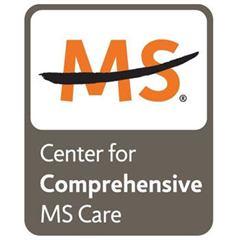Multiple Sclerosis Center
Multiple sclerosis affects your nerves, interrupting signals to and from the brain that control many functions. The condition causes a range of symptoms that can flare up and then go away.

At the Multiple Sclerosis Center at Premier Health, our board-certified specialists help you and your family manage multiple sclerosis and other neuroimmunology disorders, such as neuromyelitis optica (NMO), myelin oligodendrocyte glycoprotein (MOG),
and others. Your care team includes experienced neurologists and specially trained nurses, therapists and technologists who work together to provide personalized, compassionate care.
The Premier Health Clinical Neuroscience Institute is officially recognized as a Center for Comprehensive MS Care through the National Multiple Sclerosis Society’s Partners in MS Care program. This formal recognition honors our commitment to high quality care for those living with MS.
What is MS?
Multiple sclerosis (MS) is an autoimmune, demyelinating disease that impacts the central nervous system. It occurs when the body’s immune system attacks the protective
myelin sheath that surrounds nerve cells. This disrupts signals to the brain and causes symptoms.
At its onset, MS produces symptoms that can sometimes be so mild that the patient hardly notices them, or the symptoms subside and the patient doesn’t recognize that anything is wrong. With some types of MS, symptoms can be present and then go away,
only to return later.
Some symptoms of MS include:
- Blurry vision or vision loss
- Dizziness
- Numbness or weakness
- Pain or tingling
- Tremors
- Unsteady walking
There is no known cause or cure for MS, but it is neither contagious nor fatal.
Diagnosing Multiple Sclerosis
Your doctor may perform several tests to help diagnose multiple sclerosis. These tests may include:
- Physical exam. Your doctor will check your body and vital signs.
- Review of your medical history. Your doctor will talk with you about any other conditions you’ve had as well as your current symptoms.
- Blood tests. A blood sample will be taken and checked for signs of infection or disease.
- MRI (magnetic resonance imaging). Magnets and radio waves create detailed images of the brain and nerves.
- Lumbar puncture. A thin needle inserted into the space around the spinal column removes a sample of cerebrospinal fluid to measure the red and white blood cell count and check for signs of infection or disease.
- Evoked potentials testing. These tests measure the time it takes for the brain to respond to sensory stimulation from sight, sound, or touch.
No one test or examination can confirm MS. Your doctor will make a diagnosis after comparing the results of several tests and considering your medical history and symptoms.
Treating Multiple Sclerosis
Multiple sclerosis care and treatment is complex. Early diagnosis and initiation of treatment for MS and other neuroimmunology disorders is essential, since cumulative loss of myelin may lead to long-term disability. While there is no cure for MS, current treatments can help stabilize the disease. Medications are most beneficial when administered early in the course of the illness. In addition to medications, we offer many other therapies to treat symptoms such as spasticity, pain, bladder problems, fatigue, and weakness.
At the Multiple Sclerosis Center, we bring together a wide range of treatment methods to help our patients manage their condition and lead full lives.
We employ the use of medications and lifestyle modifications that may alleviate symptoms and slow the progression of the disease, including:
- On-site infusion suite for IV therapies with dedicated, specially trained infusion nurses
- Spasticity program with an experienced advanced practice nurse. Treatments include:
- Botox injections
- Baclofen pump evaluation and management
- Appropriate nutrition. You work with a registered dietitian who helps you create an eating plan that ensures you get the nutrients you need to stay healthy.
- Vocational therapy. You work with a vocational rehabilitation counselor to find the right kind of employment for you, or to help make accommodations at your current job.
- Occupational therapy. You work with a therapist to learn how to perform activities of daily living, such as buttoning a shirt or using the bathroom.
- Physical therapy. You work with a physical therapist to strengthen your muscles and achieve proper movement.
- Multiple Sclerosis Wellness Program is an evidence-based fitness program designed to empower those living with MS by optimizing their physical function and delaying the progression of symptoms.
- Support groups. You can attend support groups and forums to find emotional support and education by sharing with and learning from other patients and families living with MS.
- Clinical research. You may be able to receive experimental treatments by participating in a clinical trial. Your doctor will work with you to determine if a clinical trial will provide benefits to you.
- Appropriate nutrition. You work with a registered dietitian who helps you create an eating plan that ensures you get the nutrients you need to stay healthy.
Healthcare Providers
Learn about the annual Premier Health MS Update for health care providers across all disciplines involved in the care of MS patients.
Contact Us
Our specialists are ready to help you get back to the things that matter most in your life. Find a provider near you or consult our list of related practices.
Our specialists are affiliated with:

